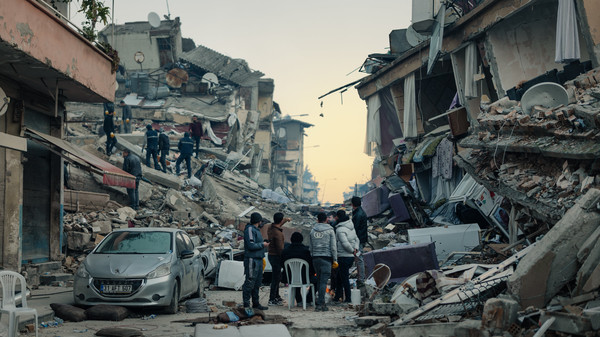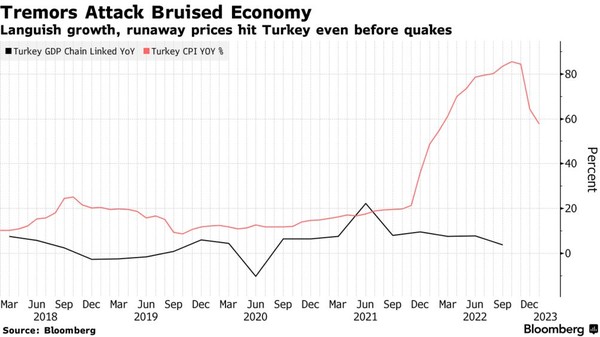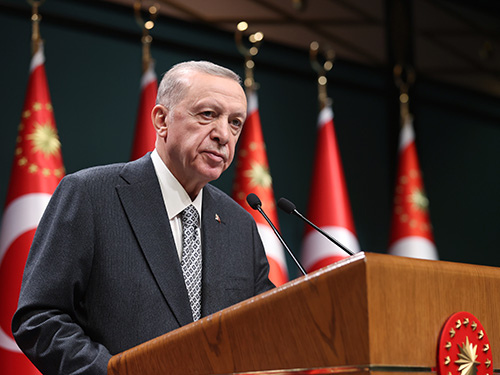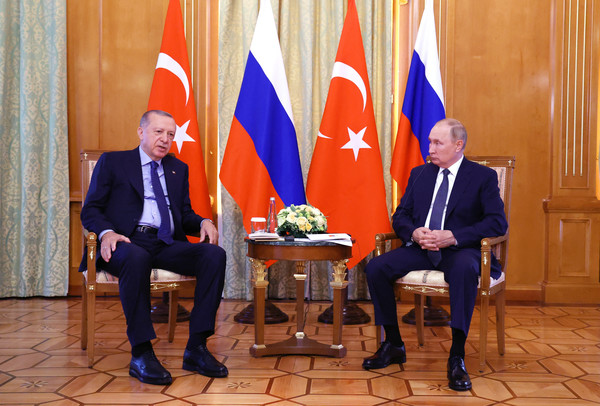
On February 6th, two massive earthquakes hit the border region of southeast Turkey and northwest Syria. These earthquakes have been recorded as one of the worst disasters so far of the 21st century, with a cumulative death toll surpassing 51,000. Above all, the fact that the aftermath of the earthquake is still ongoing adds to its seriousness. More than 10,000 aftershocks have been recorded, causing additional buildings to collapse and resulting in further casualties. Additionally, on February 20th and 27th, earthquakes of magnitude 6.3 and 5.6 occurred, respectively. More than 2 million Turkiye residents lost their livelihoods and homes. Direct damage is estimated at more than $34 billion (45 trillion won), with nearly 200,000 buildings collapsed or severely damaged. The devastating earthquakes exposed fraudulent construction and management insufficiencies, putting Turkey under President Erdogan on the verge of a catastrophic finale. Let's find out about the impact of the Turkey earthquakes on the international situation beyond the country.
1. President Erdogan’s Political Crisis
a. Government’s Poor Response
Reuters reported on March 5th that “Turkey’s earthquake death toll rose to 45,968 - interior minister.” Not only the loss of life, but also the damage to property is enormous. CNN reported on March 8th that “[the devastating earthquake] rendered millions homeless across almost a dozen cities and caused immediate damage estimated at $34 billion - or roughly 4% of the country's annual economic output, according to the World Bank.” As a result, voices of criticism against the government are pouring out in Turkiye. It is pointed out that the government's poor disaster preparedness policy, as well as the rescue work immediately after the earthquake and the preparation of countermeasures for the damaged residents, were insufficient. In particular, the Turkish government also levied the so-called Earthquake tax (also known as the Special Communication tax) after the earthquake in Izmit in 1999. Since it was passed, an estimated $4.6 billion has been collected. However, serious questions over how the money has been spent have been raised. In addition, the Turkiye government has been strengthening construction regulations after experiencing several earthquake disasters in the past. However, the helplessly collapsing buildings angered the Turkish people. Amidst criticism that many buildings are illegal structures that do not comply with regulations, the Turkey government is trying to minimize criticism by issuing orders to arrest about 100 builders of poorly constructed buildings. The BBC reported in February that "many arrests are expected - but the action will be seen by many as an attempt to divert over blame for the disaster."
b. Economic Loss

The earthquakes also caused serious economic losses. In Turkey, the 10 provinces devastated by the earthquake house 15% of the country’s population (13.4 million people) and produce 10% of its GDP. According to a report published by the Turkish Enterprise and Business Confederation (TEBC), the economic loss will be more than $84 billion. The biggest cost is expected to be spent on rebuilding houses, transmission lines, and infrastructure, and meeting the short, medium, and long-term shelter needs of the hundreds of thousands left homeless. Turkey's economy had been slowing even before the quake. The government's unorthodox monetary policy led to inflation, exacerbating income inequality, and in 2022, the lira lost 30% of its value against the dollar, experiencing a foreign exchange crisis. CNN reported in a March article that “Economists say those structural weaknesses in the economy will only get worse because of the quake and could determine the course of presidential and parliamentary elections expected in mid-May.” “Economic crises lead to public dissatisfaction” is a lesson learned from the 1999 earthquake that served as the backdrop for Erdogan's presidency. Attention is focusing on whether President Erdogan can overcome this crisis and solidify his position again.
2. The Upcoming Turkish Presidential Election

In August 1999, a 7.6 magnitude earthquake struck the Izmit province in northwestern Turkey, killing about 17,000 people. Criticism arose that there were few buildings with earthquake-resistant designs and that the government's poor response increased the damage. As a result, in the regime judgment theory against the incompetent ruling party, the Justice and Development Party founded by Erdogan won with 34% of the vote in the 2002 Turkish general election. At the time, Turkey had a parliamentary cabinet system, and the leader of the ruling party became prime minister, but President Erdogan, due to a previous prison sentence, became prime minister in March 2003, after a legal change was made. After winning two more general elections, he has now been in power for 20 years. Paradoxically, some are saying that President Erdogan, who came to power due to an earthquake, is now facing a crisis due to a different earthquake. Turkey will soon hold presidential and general elections on May 14th, moving forward the schedule from the originally scheduled June 18. President Erdogan created a sentiment in favor of his party in order to correct his declining approval rating. On February 8th, President Erdogan announced in a media report that “It is impossible to prepare for disaster this big… This is a time for unity, solidarity. In a period like this, I cannot stomach people conducting negative campaigns for political interests.” In response, survivors criticized Erdogan. Three days later, he admitted for the first time that the government's response had not gone as quickly as he had hoped, adding that he had assembled "perhaps the world's largest search and rescue team." Judging from the mention of “opportunists who want to turn this pain into their political gain”, it seems that he is conscious of the political situation.
3. Conflict Between Turkey and the Western Countries
a. Historical Relations with the West
On October 29th, Turkey will mark its 100th anniversary as a Republic. The Ottoman Empire, which once spanned Europe, Asia, and Africa, vanished into the mists of history after World War I. Founded as a predecessor of the Ottoman Empire, today's Turkiye established its ideology and identity centered on its first president, Mustafa Kemal Atatürk (1881-1938). President Atatürk discovered the contradictions of the Ottoman Empire's sultanate monarchy and established a secular republic. He promoted strong de-Islamization and Westernization, and Turkey has walked a path that is clearly distinguished from that of Middle Eastern countries such as Iran and Iraq. At the same time, Turkey defended southern Europe and western Asia from the Iron Curtain during the Cold War. The reason was a total of 13 'Russian-Turkish' wars between the Russian Empire and the Ottoman Empire from the 16th century to the early 20th century. In fact, Turkey sent the fourth largest number of combat troops to the Korean War in 1950. This proves that Turkey chose to side with the West in the Cold War. As a result, Turkey was accepted into NATO in 1952 and has received significant military aid. However, after Erdogan came to power, a rupture with the West began. US military aid to the Kurds is one of the biggest causes of the conflict. The Kurds are a single ethnic group that has been steadily demanding independence from Turkey. About 22.5 million people, or about 20% of the population of Turkey, are known to be Kurds. In order to use these Kurds to eliminate Islamic extremist forces, the United States has continuously supported them. As a result, the conflict with Turkey, which stubbornly opposes the formation of a Kurdish self-government, continues. Meanwhile, relations between Turkey and Russia are improving. In October 2022, despite Western pressure related to Russia's invasion of Ukraine, the two countries continued cooperative relations, including strengthening cooperation on gas and nuclear power plants.
b. Cases of Fluctuating Conflict with the West

In addition to the Kurdish-related confrontation, Erdogan's representative policy is also amplifying conflict with western countries. First of all, President Erdogan is an Islamist. In February, AP News reported that “Erdogan reaffirmed that Turkey won’t allow Sweden to join the NATO military alliance as long as the Scandinavian country permits protests desecrating Islam’s holy book to take place.” The Turkish national broadcaster TRT even said that “Sweden needs to prevent Quran burning protests.” Erdogan also supports Neo-Ottomanism1 represented by hegemonism2 and expansionist policies. This is bad news for the West. However, strong sanctions against Turkey are difficult due to geopolitical reasons. Turkiye is the hinterland of the Middle East, the powder keg of the world. The Bosphorus Strait, that connects the Black Sea and the Mediterranean, is also owned by Turkey. Moreover, since Turkiye is the first destination for refugees from the Syrian civil war, the West has no choice but to maintain good relations with Turkiye. Because of the anti-Islam protests, Turkey has repeatedly rejected Sweden and Finland's NATO membership. In order to become a member of NATO, the United States has no choice but to watch as full agreement to join the 30 member states must be ratified. It is also the reason why President Biden emphasized the integration of NATO. In May 2022, President Biden said in a statement, “I warmly welcome and strongly support the historic applications from Finland and Sweden for membership in NATO,” and “the United States will work to remain vigilant against any threats to our shared security and to deter and confront aggression or the threat of aggression.”
On May 14th, a decision will be made on whether or not the Erdogan government will continue. For now, experts speculate that if he presents an amicable solution to the existing domestic refugee problem and the Kurdish rebels, and manages well the public sentiment caused by the earthquake, there is no possibility of re-election. However, while the incumbent government was criticized for inflation and economic difficulties, a strong competitor emerged. On March 6th, the Reuter News Agency said, “Turkish opposition (Republican People’s Party) leader Kemal Kilicdaroglu believes his time may have come after suffering repeated election defeats…” Kilicdaroglu is working to build a position, telling the headquarters of the Felicity Party, “We will establish the rule of morality and justice together.” In addition, the West is watching the unstable approval ratings of Erdogan, who has been called “ruling with an iron fist.” While the confrontational structure between the West and Russia is sharpening due to Russia's invasion of Ukraine, the amicable relationship between Erdogan and President Putin is straining the West. Whether or not Erdogan wins or loses is expected to shake the dynamics of not only Turkey but also the western world. It is also the reason why the whole world pays more attention to Erdogan's moves amid the accelerating pace of the new Cold War between the West and Russia-China and how another political game of the 'Sultan of Europe' Erdogan, will be expressed.
1 an Islamist, irredentist and imperialist Turkish political ideology
2 the theory of hegemony that denoted the political, economic, and military predominance of one country over other countries

